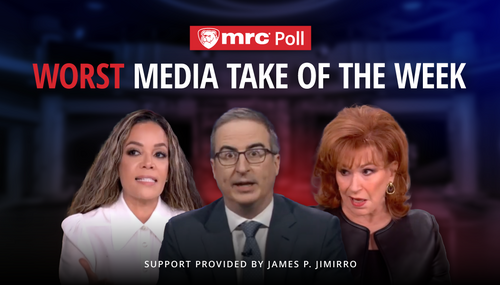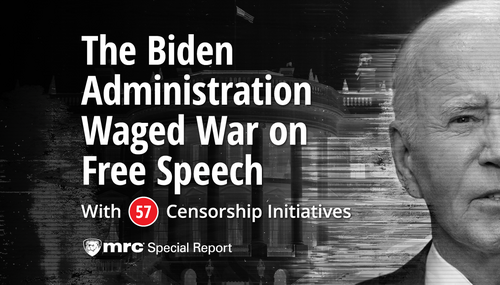Newsweek's Eleanor Clift must have felt like a fish out of water during the taping of this weekend's syndicated "McLaughlin Group."
In a lengthy and tremendously informative segment about the crisis in Egypt, the host and his other three guests - Pat Buchanan, Monica Crowley, and Mort Zuckerman - gave the perilously liberal columnist quite a lesson regarding the Obama administration's diplomatic mishandling of Hosni Mubarak as well insights about the Muslim Brotherhood that most in the media are ignoring (video follows with transcript and commentary):
MORT ZUCKERMAN: But having said that, [Hosni Mubarak] has been a steadfast ally of the United States for 30 years. And the only way – it is absolutely fair and right to think that this is time for him to leave. But if you want him to leave, we did it in exactly the wrong way, which is to do it publicly, which is humiliating for an Arab leader. And of course, therefore when we sent a special envoy whose message, whose mission was leaked, namely that he was going to ask Mubarak to leave, he gave him a very brief meeting and said I don't want to talk to you again. Because this man has been around as an ally and expects to be treated as an ally for 30 years, and therefore it seems to me we should have found a better way to get to him.
Now, let me just say, I want to say one thing. Let's just remember this: in Tehran there were hundreds of thousands of people in the street. Iran was our principal enemy in that part of the world and this administration said nothing. But here we take a 30-year ally of the United States and we start publicly attacking him. That was exactly the wrong way to do it in that part of the world. Now the, the Saudis, the Jordanians, most of the other countries are enraged because they feel in a sense he was not badly, he was badly treated and not treated with respect.
Fabulous point by Zuckerman that most in the media have been oblivious to.
If Mubarak's time has come to depart, our diplomatic play is to privately assist him in doing so as peacefully as possible in order for our long-term ally to save face and to demonstrate to other leaders we support that we would do the same for them in a similar situation.
By so quickly backing the protestors, Obama has not only snubbed someone that has been very important to America for three decades, but also likely damaged our relations with other leaders in the region.
In addition, as Zuckerman accurately stated, this is quite a contrast from Obama totally ignoring Iranian protests in 2009 against a man that is our mortal enemy. This inconsistent strategy regarding the Middle East has to be confusing and concerning to all those watching.
But there was more:
JOHN MCLAUGHLIN, HOST: Hold on. I want to pick up that point, because this goes to that. Okay. Now a big Arab authority, a big one, the Secretary General of the 22 nation Arab League, Amr Moussa, said this:
(BEGIN VIDEOTAPE)
AMR MOUSSA, SECRETARY GENERAL ARAB LEAGUE: The message has been sent, the message has been received. It will never be the same again. I firmly believe that the Arab world in one year's time will not be the same as we see it today.
(END VIDEOTAPE)
MCLAUGHLIN: In one year’s time the Arab world will not be the same. Question, what is the chance that Moussa will run for president himself?
PAT BUCHANAN: Pretty good. He's head of the Arab League, he’s a transitional figure. Look, the Mubarak era is over, but Mort is right. This is a soldier, a man of honor. He sent his troops to fight alongside us…
MCLAUGHLIN: You’re talking about Mubarak?
BUCHANAN: I'm talking about fighting the Gulf War, and here comes this diplomat over there and he says, “Hey, get out.” They're humiliating him. I think he got his back up and understandably so.
MCLAUGHLIN: Why did Obama do it? Because he wants to be on the side, because he knows it's a done deal. And he wants to establish his bona fides with the incoming group. Is that it?
BUCHANAN: He went back to his, basically if you will, his sort of moderate left mode, this is a Facebook-Twitter revolution, I'm part of this.

BUCHANAN: He got too far out in front.
CLIFT: You make it sound…
MCLAUGHLIN: I still don’t get it. Who are his advisors on this? Who are Obama’s advisors?
BUCHANAN: He advises himself on this one. I think that’s what’s comes out of his feelings.
CLIFT: You make it sound like this is some sort of fad he wants to get on the Twitter bandwagon.
BUCHANAN: He wants to get out in front of things.
CLIFT: Look at all the dictators that this country has stuck with too long.
BUCHANAN: Eleanor...
CLIFT: He has served our purposes well.
He has served our purposes. Liberal media members sure know how to treat their allies, don't they?
BUCHANAN: You don’t do that to friends of 30 years.
ZUCKERMAN: That’s right.
CLIFT: He did not serve his people very well. He has run a repressive regime.
BUCHANAN: Who are we to decide that?
CLIFT: We are not deciding it. He is deciding it. He's still in power. And this president is giving him a nudge behind the scenes…
ZUCKERMAN: Not behind the scenes.
MONICA CROWLEY, WASHINGTON TIMES: No.
CLIFT: …which is something that he needs…
CROWLEY: No, no.
CLIFT: …and he’s calling for…
ZUCKERMAN: Publicly. Publicly.
CLIFT: The President should just stand by?

[CLIFT AND ZUCKERMAN TALK OVER EACH OTHER]
ZUCKERMAN: I’m not talking about the transition. He wanted him to leave now, and we all know it.
MCLAUGHLIN: Right, right. He’s telling him to leave.
ZUCKERMAN: That’s right, that’s exactly what he told him.
CROWLEY: Right, I agree with Mort completely. Look, the administration mishandled this from the beginning and it's not unlike how they…
MCLAUGHLIN: Why? Why?
CROWLEY: …how they handled the Israeli-Palestinian negotiations which they did in public and it blew up in their faces. Diplomacy 101 is especially when you're dealing with a stalwart ally like Hosni Mubarak is you take this behind closed doors. You don't have the American president give a big declaration. Look, the other point he raised, Moussa, Moussa is now the choice as of this moment of the Muslim Brotherhood.
ZUCKERMAN: Right.
CROWLEY: The Muslim Brotherhood now is working this crisis so that they can ride the tide to seize power, and I’m telling you if they grab power in Egypt, they…
MCLAUGHLIN: Hold on.
CROWLEY: …they will consign 82 million Egyptians to the perpetual darkness of the Islamist rule. And don't make any mistake about it, let's not be naïve about this.
MCLAUGHLIN: You remember when the Muslim Brotherhood were the really bad guys over there?
CROWLEY: They are the bad guys.
BUCHANAN AND ZUCKERMAN: They are the bad guys
MCLAUGHLIN: They are the bad guys today?
CROWLEY: Yes.
MCLAUGHLIN: How many Muslim Brotherhood are there?
ZUCKERMAN: They’re probably a third of the population.
BUCHANAN: Hamas is part of the Muslim Brotherhood.
CROWLEY: It doesn’t matter.
CLIFT: And they’ve been bad…
MCLAUGHLIN: How do you account for the fact that the Muslim Brotherhood that were the bad guys are now the good guys?
CROWLEY: They’re not the good guys.
ZUCKERMAN: I didn’t say they were the good guys. Let me just tell you, Hosni Mubarak …
MCLAUGHLIN: Do they control the strings of power. Do they control the strings of power?
BUCHANAN: No.
ZUCKERMAN: No, they do not yet. The army controls the strings of power. No, this whole issue is going to turn on what the army does. But let me just point out one thing, and Mubarak knows it, okay, because he happened to be sitting next to Anwar Sadat when the Muslim Brotherhood assassinated Anwar Sadat, one of the great figures out of that country. It was the Muslim Brotherhood who assassinated him.
MCLAUGHLIN: They defeated him.
ZUCKERMAN: Absolutely, they killed him.
MCLAUGHLIN: Did they do him in?
ZUCKERMAN: They did. They killed him.
MCLAUGHLIN: Did you hear that?
ZUCKERMAN: The Muslim Brotherhood is not a backer of democracy.
BUCHANAN: If their democracy comes one man, one vote…
CROWLEY: One time!
BUCHANAN: …in Egypt, let me tell you, the Muslim Brotherhood will initially get 25 to 33 percent of the vote, and the Arab street’s views about Israel will be reflected in the government.
Indeed, and for their part, since this crisis began, the overwhelming majority of media members have been badly misrepresenting the Muslim Brotherhood as a force for good in Egypt. A bit later in the program, Crowley put a finer point on this:
CROWLEY: I think that we in the West have fallen into a trap of romanticizing what the Arab street would want if they were given true democracy as we understand it. Because when you look at recent polls of the Egyptian people, 75 percent say they would like Islamic law, they would like Sharia. 65 percent say they would like the reinstitution of the Islamic Caliphate. When you talk about democracy, it is not going to be a Jeffersonian democracy, it is going to be one vote like we saw in Gaza with Hamas, one man, one vote, one time.
100 percent right. The media have indeed romanticized these protests from the moment they started rather than honestly informing the public not only about Obama's missteps but also the risks of us getting this wrong much as Jimmy Carter did with Iran over 30 years ago.
Fortunately for viewers, Buchanan, Crowley, and Zuckerman were on the set to present the more-reasoned view of this current crisis while making it quite clear that Clift - like so many in the liberal media - is indeed caught up in some romantic haze about this situation making her completely unqualified to offer anything other than a view the adminstration would be happy with.
Now that's an ally so-called journalists know how to serve and support.




